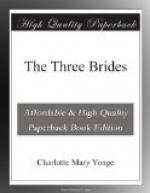“I do not think you will do that, papa, after your promise to Camilla.”
She had conquered. No further objection was made to her being as much as she pleased with the Charnocks as long as they remained at Rockpier, nor to her correspondence with Frank when he went away, not to solitary lodgings as before, but to the London house, which Miles and Anne only consented to keep on upon condition of their mother sharing it with them.
CHAPTER XXXVII The Third Autumn
A good man ther was of religion,
That was a poure Persone of a toune;
But rich he was of holy thought and work,
He also was a learned man a clerk.—CHAUCER
Autumn came round again, and brought with it a very different September from the last.
Willansborough was in a state of commotion. That new Vicar had not only filled the place with curates, multiplied services in the iron church, and carried on the building of St. Nicholas in a style of beauty that was quite affronting to those who were never asked to contribute to it, but he gave people no peace in their easy conventional sins, pricked them in their hearts with personal individual stings, and, worse than all, protested against the races, as conducted at Wil’sbro’.
And their Member was just as bad! Captain Charnock Poynsett, instead of subscribing, as part of his duty to his constituents, had replied by sending his brother Raymond’s half-finished letter to the club, with an equally strong and resolute one of his own, and had published both in all the local papers.
Great was the fury and indignation of Wil’sbro’, Backsworth, and all the squires around. Of course it was a delirious fancy of poor Raymond Poynsett, and Miles had been worked upon by his puritanical wife and ritualistic brother to publish it. Newspapers teemed with abuse of superstition and pharisaism, and praise of this wholesome, moral, and ‘truly English’ sport. Gentlemen, and ladies too, took the remonstrance as a personal offence, and threatened to visit no more at Compton; the electors bade him look to his seat, and held meetings to invite ‘Mr. Simmonds Proudfoot,’ as he now called himself, to represent them; and the last week, before the races, the roughs mobbed him in Water Lane. He rode quietly through them, with his sailor face set as if against a storm, but when he was out of the place, he stopped his horse at Herbert Bowater’s lodgings, that his black eye might be washed, and the streams of rotten egg removed from his coat before he presented himself at home. Not that he had much fear of startling his wife and mother. It was more from the Englishman’s hatred of showing himself a hero, for Anne was perfectly happy in the persecution he had brought on himself, for she never had been so sure before that he was not of the world, worldly.




